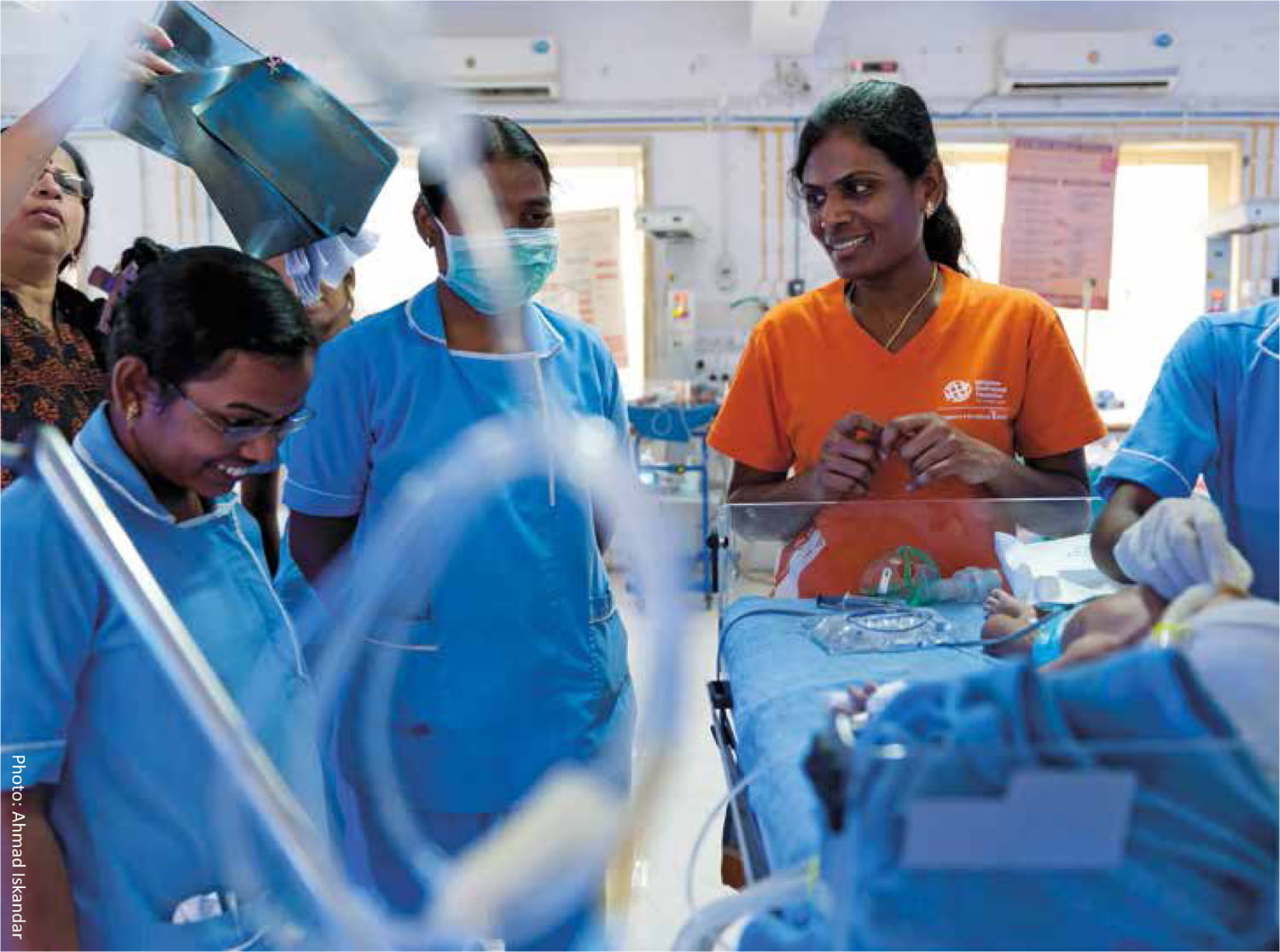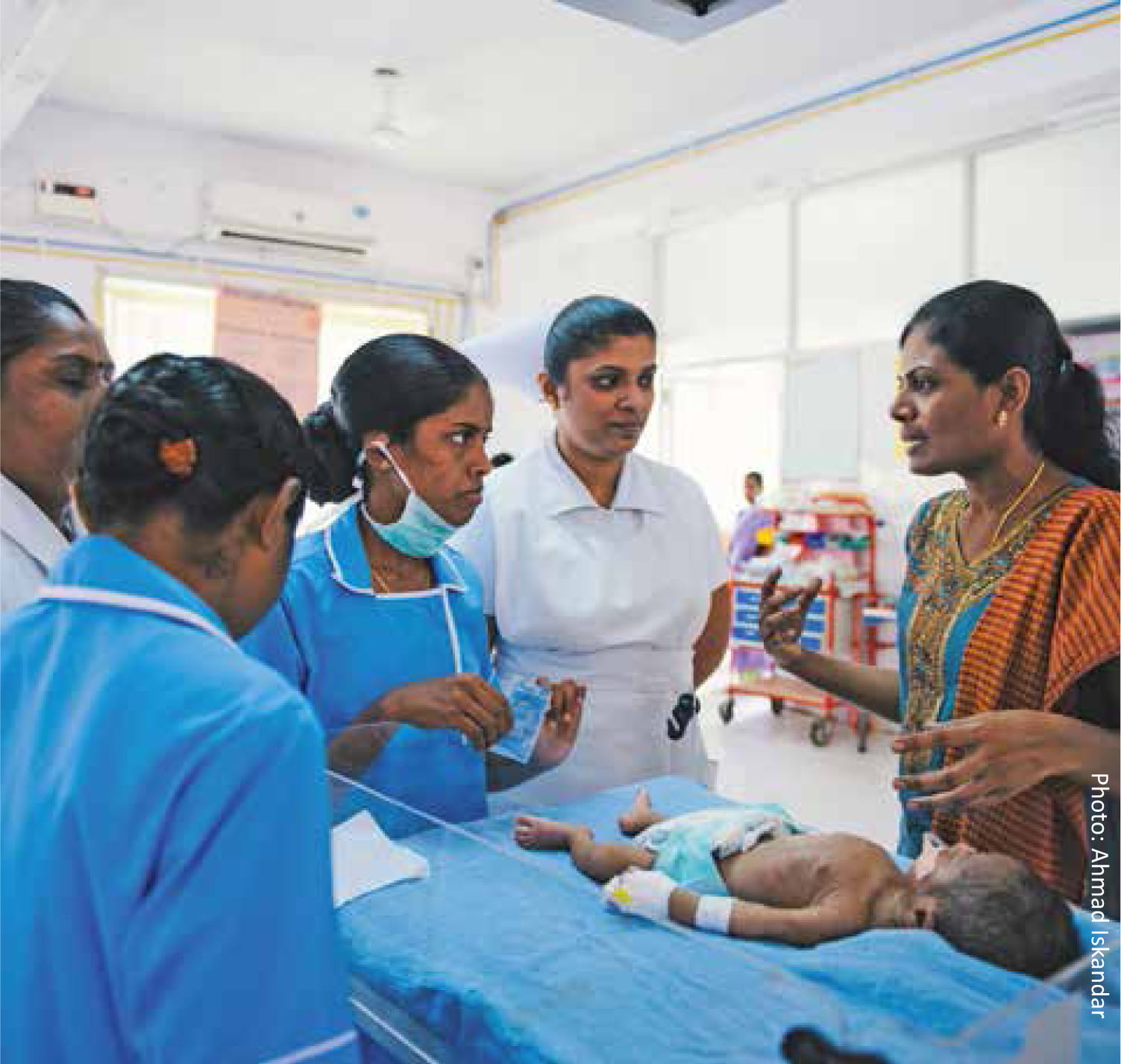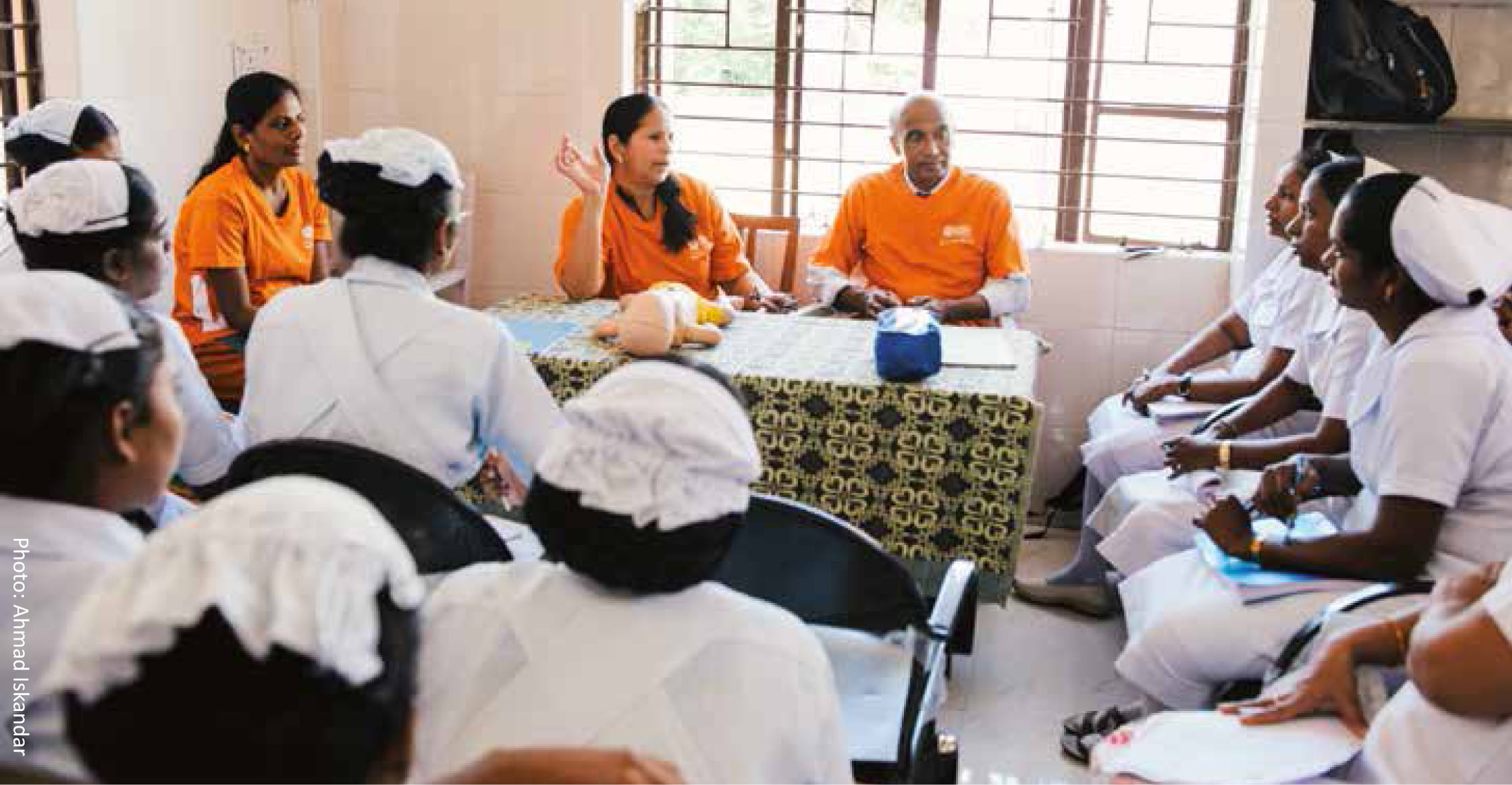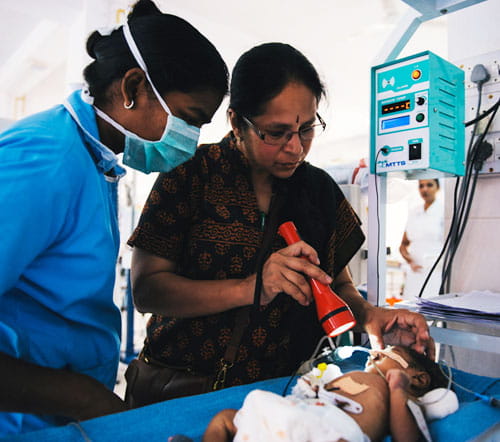Stories > Labour of Love
Labour of Love

Singapore International Volunteers; Kulandaisamy Ronikal Infenda, a neonatal ICU senior nurse (pictured in an orange Singapore International Foundation Volunteer t-shirt) and Dr Bhavani Sriram, Senior Consultant, Department of Neonatology at Singapore’s KK Women’s and Children’s Hospital (holding X-ray film at far left) working alongside their Indian peers to uplift their professional standards, so that critically ill babies in Chengalpattu can benefit from better care.

Two volunteer doctors in Singapore return to India, their country of origin to share essential medical skills to help save lives of critically-ill newborn babies.
By Melissa De Silva
like working in the ICU and I want to take on the sickest babies because it is a challenge to get them better. And when they are better, I feel so happy,” says Ronikal Infenda, Senior ICU nurse at the department of neonatology at the KK Women’s and Children’s Hospital (KKH).
It was this sort of passion that she and Dr Bhavani Sriram, Senior Consultant, Department of Neonatology at Singapore’s KK Women’s and Children’s Hospital, and a team of other volunteer nurses and doctors brought with them to the district of Chengalpattu in Tamil Nadu, India. For over four years (2010-2013), they worked with the Chengalpattu Medical College and Hospital (CMCH), a regional public medical centre which provides free healthcare. Better equipped than most, this government hospital takes on complex cases that other healthcare centres or hospitals in the surrounding towns and suburbs cannot cope with.
Singapore International Volunteer, Dr Bhavani Sriram on her rounds carefully inspecting babies for signs of infection.
Dr Sriram, who comes from the state of Tamil Nadu herself, says that the volunteer team identified two major causes of disease “related to infections with the newborn and ventilator management and application of the ventilator device (CPAP).”
“We realised it is easier to implement practices to control infections, and hence taught both doctors and nurses to implement multiple changes in practice.”
These included preparation of a sterile trolley for drip settings; hand-washing and hygiene practices; standardised ways of setting drips and managing intravenous lines in a sterile manner; and preparing sterile containers and tool kits for setting drip.
They therefore shared knowledge to help reduce infection. This involved conducting practical lessons and supervising many of the practical procedures undertaken by the local staff. Says Dr Sriram, “We formally accredited them for all the procedures. We identified a few staff who would be the local champions in our absence. This proved to be very effective, as we did see a great reduction in the incidents of infection over the next six months.”
“It is indeed wonderful to go back to serve the country and state that helped you to become a professional doctor.”
— Dr Bhavani Sriram, Senior Consultant, Department of Neonatology at Singapore’s KK Women’s and Children’s Hospital

Singapore International Volunteer Kulandaisamy Ronikal Infenda, a neonatal ICU senior nurse in KK Women’s and Children’s Hospital (pictured in the extreme right) demonstrating neonatal resuscitation skills for Chengalpattu Medical College and Hospital’s Neonatal ICU nurses. The neonatal skills training project brought the Singapore and Indian medical communities together to share their knowledge and clinical skills with the common goal to save young lives.
One of these procedures, explains Dr Sriram, was the application of the CPAP ventilator device, which helps babies suffering from respiratory distress to breathe easier. There was a high incidence of injuries related to the application of the equipment, so the local team was keen to learn its principles and management.
Kulandaisamy Ronikal Infenda, who attained her nursing training in Chennai, India, came to Singapore 12 years ago to work at KKH. She recounts that “during the initial training sessions at CMCH, I realised that oxygen tubes in the babies were often not secured properly. If the tube comes out even by 1cm, it will be out of the trachea. This can cause respiratory distress and constantly changing the tubes took up much time.” So she taught the trainees plastering techniques to intubate the babies more effectively.
When a baby breathes through a ventilation tube, the body considers this a foreign object and the lungs produce secretions in response. These secretions can be lethal. “So we taught them how to do endo tracheal tube suctioning (ETT), and explained why suctioning is so important,” says Infenda.
They also noticed that the intravenous drip setting was done by plastering the baby’s entire hand to secure the cannula (metal tube that is inserted into the body). If the patient’s hand was to swell or pick up an infection, it would not be visible. “I did a demonstration for them, showing them how to expose the hand using the materials they had available,” says Infenda.
The volunteers also explained the value of hand hygiene in protecting the babies from infection. “Initially, there were only a few sanitisers in the ward and they were not frequently used,” says Infenda. The trainees were introduced to a system of having a hand sanitiser next to each baby.
The use of equipment trays and the emergency trolley were also systematised. “We encouraged them to have one tray for each baby, with cotton balls, gauze and sterilised equipment. Previously, the items were in various places and they had to spend precious time running around to get each item.” The emergency trolley used to be parked in the store room. “Dr Bhavani told them that it should be equipped with emergency medicine and equipment and that one staff member needs to check daily that everything is in its place, so no time is wasted looking for things.”
Says Infenda, “What I have learned in Singapore, I try to give to those back in my own country. I am very happy to do this. I told the nurses there, I too was from a college in Chennai and I feel satisfied for bringing the best practices in saving infants to India.”
Resounding Results
From 2010 to 2013, a team of specialist volunteers comprising neonatal doctors and ICU nurses from KK Women’s and Children’s Hospital (KKH) in Singapore conducted skills training for about 220 of their peers in Chengalpattu, Tamil Nadu, in the areas of neonatal resuscitation, infection control and effective neonatal transportation practices. All are skills critical to saving the lives of premature and critically ill babies. After four years, CMCH has seen this pay off with a 15% reduction in infection-related infant mortality thanks to improved respiratory management practices and stronger infection control standards.

A training session. The four year international collaboration between Singapore International Foundation and Chengalpattu Medical College and Hospital brought Singapore’s top medical specialists in neonatology to Tamil Nadu to share life-saving knowledge and skills with their Indian peers, benefitting critically ill newborns in Chengalpattu. The trainer (in centre of picture, in an orange Singapore International Foundation Volunteer t-shirt) is Singapore International Volunteer Clinical Associate Professor Victor Samuel Rajadurai, Head and Senior Consultant at the Department of Neonatology, KK Women’s and Children’s Hospital.
“What I have learned in Singapore, I try to give to those back in my own country.”
— ICU nurse Ronikal Infenda
“The fulfilling aspect is that despite a heavy workload, the staff, both doctors and other professionals were very interested and attended all the training sessions,” says Dr Sriram. “They were very motivated to learn, and wanted to show an improvement in outcome, and despite a resource poor atmosphere they adapted many suggestions to improve outcomes.”
Dr Sriram says that another fulfilling aspect of being involved in the project was to see a marked reduction in the incidence of infections, morbidity and mortality, as well as the opportunity of giving back to her home country.
“I enjoyed speaking the same language and I enjoyed the hospitality. It is indeed wonderful to go back to serve the country and state that helped you to become a professional doctor.”


